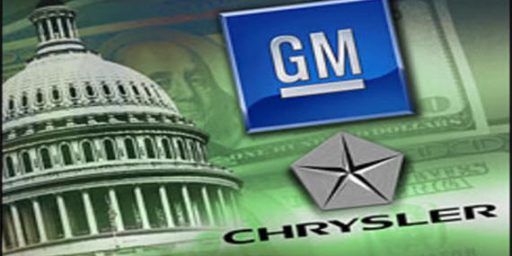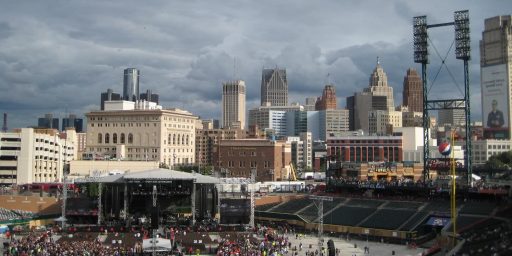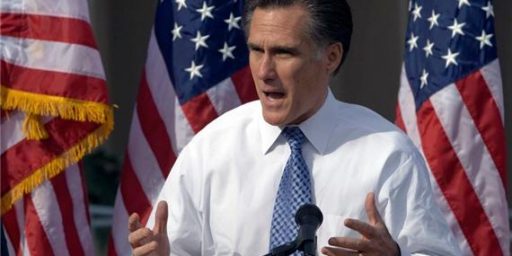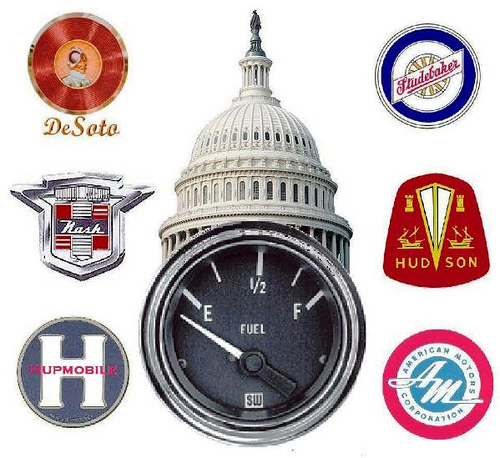Bush May Bail Out Big 3 without Congress
President Bush may ignore Congress and give the Big 3 the money they want, anyway.
Worried about the weakening economy, the Bush administration said it was ready to step in and prevent the U.S. auto industry from collapsing after the Senate refused to pass a rescue bill endorsed by President George W. Bush and congressional Democrats. The most obvious source of help was the Wall Street bailout fund.
“The current weakened state of the economy is such that it could not withstand a body blow like a disorderly bankruptcy in the auto industry,” White House press secretary Dana Perino said.
Treasury spokeswoman Brookly McLaughlin said, “Because Congress failed to act, we will stand ready to prevent an imminent failure until Congress reconvenes and acts to address the long-term viability of the industry.”
That the bailout fund in question was designated for entirely different purposes and is blatantly unconstitutional doesn’t seem to bother the president.
One wonders if Democrats will rail against this as an abuse of power or see it as an act of benevolence. (Not that they can’t do both, obviously.) Conversely, Republicans who’ve defended Bush’s bypassing legal niceties to advance his policy preferences elsewhere aren’t in the ideal position to criticize.






I believe the Dodd bill that ultimately passed, both reigned in the Treasury Dept’s discretion and expanded the scope of the bailout to include a broad definition of “troubled assets.”
LINK
PD: Agree that the law was poorly written, which is why I opposed the bailout as done. Still, it was clearly designed to apply to the financial sector, not manufacturing.
The TARP funds were aimed at the banking system but the legislation allowed wide discretion on the part of Treasury in determining which firms were critical to the system. I think an argument can be made that the auto companies employ enough people that if they fail it would have a devastating effect of bank balance sheets as mortgage defaults would skyrocket. So I really don’t see how one can assert unequivocally that using TARP funds to bail out the auto companies is unconstitutional.
That Bush is a criminal rogue who has acted outside the law and the constitution is not in question. But an auto bailout is not one of those crimes, in my opinion.
“and is blatantly unconstitutional doesn’t seem to bother the president.”
This “president” has been quoted as saying “the constitution is just a piece of paper”, so why the surprise.
I have to admit I don’t see the difference between bailing out the auto industry and bailing out the financial sector. Neither should have been done, but if you give 700 billion to the financial sector, it seems odd to quibble about giving 14 billion to manufacturing.
That’s impressive… it’s the Republicans in the Senate who put down the auto bailout, but you still find a way to insult the Dems over it.
Frankly, it’s entirely probable that the failure of the automakers would have a much larger impact (at least jobwise) than the loss of the banking industry, given all the other dependent industries. On the other hand, the banks failed largely because gov’t regulators took a vacation for the last 8 years, not enforcing what few rules the Bush administration (and, I admit, Clinton as well) left in place. Given real rules and enforcement, there could be some confidence that the banks would stop slitting their own throats.
The automakers, on the other hand, have shown consistently since the oil crisis of the 70s that they cannot, and are not interested in even trying to, change their suicidally incompetent management and product design strategies. In a few more years, they’ll be at the teat again, begging for more.
And what about those of us who fall in neither camp?
I oppose the bailout and my only “insult” to the Dems is that they might change their stance on the evil that is Bush if he circumvents the Senate and does what they want.
I have to admit I don’t see the difference between bailing out the auto industry and bailing out the financial sector. Neither should have been done, but if you give 700 billion to the financial sector, it seems odd to quibble about giving 14 billion to manufacturing.
One word. Union.
“On the other hand, the banks failed largely because gov’t regulators took a vacation for the last 8 years, not enforcing what few rules the Bush administration (and, I admit, Clinton as well) left in place.”
Enlighten us, legion, exactly which important regulations did the Bush Administration eliminate? Please be specific.
Your obvious concern for regulatory enforcement tells me you will agree with me that Barney Frank, Chris Dodd and Maxine Walters should be impeached for their vociferous and mocking objection to the regulatory reforms and serious concerns advocated and highlighted by the regulators of Freddie and Fannie in 2003.
Right?
From the Detroit Free Press:
“If the jobs bank ends? Then I’m going to be without,” said Lawrence Faw, 47, a Chrysler LLC worker who has been in the jobs bank for the past four years after last working at the Warren Truck Assembly Plant.
Faw said most people don’t understand the community service part of the jobs bank, where he has worked for area churches.
When UAW autoworkers are laid off, they receive a combination of unemployment benefits and supplemental pay from their employer for 48 weeks. If they remain laid off beyond that, they move to the jobs bank, where the company provides about 95% of their pay and benefits.
Faw said most people don’t understand that he had received overtime pay for several years straight before he went into the jobs bank. The jobs bank pay is based on 40 hours without any overtime and represents a significant pay cut from those days.
He said he’s taking home about $600 a week now after taxes and other deductions. His wife lost her job in 2003 and started a family printing business. They’ve already gone through much of their savings.
Faw said he’s stayed in the jobs bank because he’d like to retire after 30 years at Chrysler. What happens if the jobs bank and Chrysler stall out?
“I have eight years to go,” Faw said. “And the way things are going right now, it’s not looking too good.”
You know, I feel for anyone who has lost a job.
However, this guy has not actually worked in about five years and apparently doesn’t intend on working for another eight years – until retirement.
A word of perspective; It is not really “the big three that is being referred to here,it is the “big two” or even the “big one”.
Ford has not asked for any payment,but may need a line of credit in the event that GM & Chrysler receive cash bridge money.
Now here’s the kicker… Cerberus[Chrysler’s owner]also owns controlling interest in GMAC!
Cerberus then effectively owns both GM and Chrysler, making Cerberus ostensibly the sole recipient of “bail-out” money. Go figger!
You make an excellent point, Floyd.
So we are bailing out private equity now?
Didn’t GM sell the GMAC division a couple years ago?
Listen, there is something called “executive privilege.’ People keep on forgetting: WE ARE AT WAR. Bush is the Commander in Chief. If he needs to do this to continue to keep our country safe from evil, then he has the authority–and obligation–to do it.
I don’t get how it is “blatantly unconstitutional.” Isn’t that a little hyperbolic?
Actually, 10 Republicans crossed the aisle. If Reid could have rallied the Democrats he’d have had more than enough votes. It was a handful of Senate Democrats that put it down, including Vice-President elect Joe Biden.